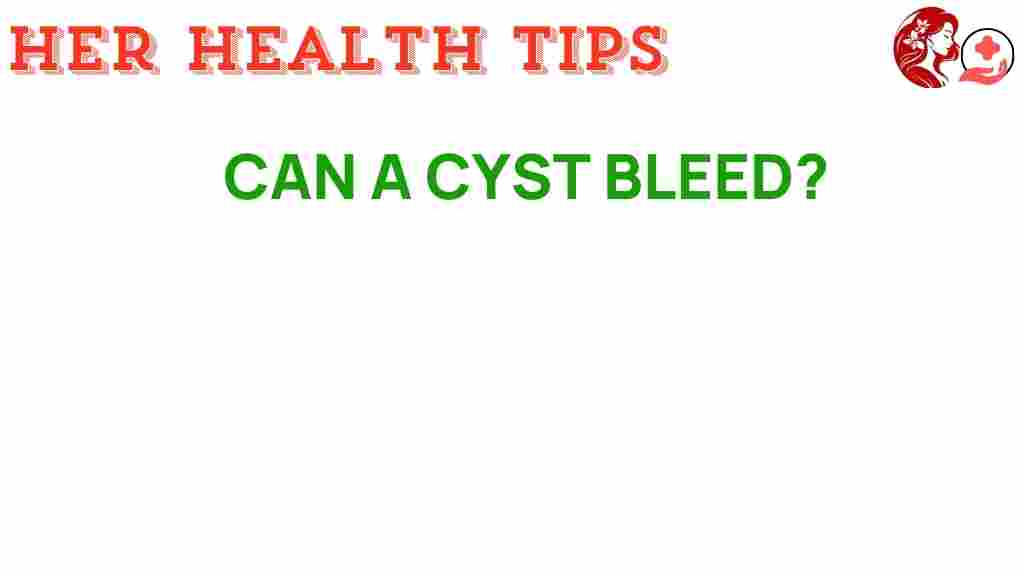Unraveling the Mystery: Can a Cyst Bleed?
Cysts are fluid-filled sacs that can develop in various parts of the body, and they often raise questions about their nature and potential complications. One common concern among patients is whether a cyst can bleed. In this article, we will explore the phenomenon of cyst bleeding, its symptoms, potential causes, diagnosis, and treatment options. By understanding these aspects, patients can make informed decisions regarding their healthcare and seek appropriate medical attention when necessary.
What is a Cyst?
A cyst is a closed sac-like structure that can be filled with fluid, semi-solid material, or gas. They can occur in any tissue in the body and vary in size from microscopic to several centimeters in diameter. Cysts can be classified into two main categories:
- Simple cysts: Typically benign and filled with fluid. They often do not require treatment unless they cause discomfort or other issues.
- Complex cysts: May contain solid components or have irregular shapes. They can raise concerns for malignancy and may require further evaluation.
Understanding Cyst Bleeding
Cyst bleeding refers to the rupture of a cyst, leading to the release of its contents into surrounding tissues. This can happen for various reasons, including trauma, infection, or changes in pressure within the cyst. While not all cysts bleed, it is essential to be aware of the symptoms associated with this occurrence.
Symptoms of Cyst Bleeding
When a cyst bleeds, patients may experience a range of symptoms, which can vary depending on the location and type of cyst. Common symptoms include:
- Pain: Sudden, localized pain may occur, especially if the cyst is pressing against nearby structures.
- Swelling: Increased swelling in the area of the cyst can be a sign of bleeding.
- Redness: The skin overlying the cyst may become red or inflamed.
- Fluid drainage: In some cases, there may be visible drainage of fluid from the cyst.
- Fever: If the cyst is infected, systemic symptoms like fever may occur.
Causes of Cyst Bleeding
There are several potential causes for cyst bleeding. Understanding these can help in the diagnosis and management of the condition:
- Trauma: Physical injury to the area where the cyst is located can lead to rupture.
- Infection: Inflammatory processes may weaken the cyst wall, causing it to bleed.
- Hormonal changes: In certain types of cysts, hormonal fluctuations can trigger bleeding.
- Pressure changes: Increased pressure within the cyst, due to internal changes, can lead to rupture.
Diagnosis of Cyst Bleeding
If you suspect that a cyst may have bled, it is crucial to seek medical attention for an accurate diagnosis. The healthcare provider will typically follow these steps:
- Medical history: Discuss symptoms, duration, and any potential triggers with your doctor.
- Physical examination: A thorough examination of the affected area will help identify signs of bleeding or infection.
- Imaging studies: Ultrasound, CT scans, or MRI may be performed to visualize the cyst and assess for complications.
- Laboratory tests: Blood tests may be ordered to check for signs of infection or other underlying health issues.
Treatment Options for Cyst Bleeding
Treatment for cyst bleeding depends on the severity of the symptoms and the underlying cause. Options may include:
- Observation: In cases where the bleeding is mild and asymptomatic, doctors may recommend monitoring the cyst.
- Medications: Pain relievers and anti-inflammatory medications can help manage discomfort.
- Drainage: If the cyst is large or causing significant symptoms, a healthcare provider may perform a procedure to drain the cyst.
- Surgery: In cases of recurrent cyst bleeding or complex cysts that raise suspicion for malignancy, surgical removal may be necessary.
Prevention and Patient Education
While not all cysts can be prevented, there are some strategies that may reduce the risk of complications:
- Regular check-ups: Routine medical examinations can help monitor existing cysts and detect changes early.
- Awareness of symptoms: Educating yourself about the signs of cyst bleeding can facilitate early intervention.
- Healthy lifestyle: Maintaining a healthy diet, staying hydrated, and exercising regularly can promote overall health and reduce the risk of cyst formation.
For more information and resources about cysts and related medical conditions, visit healthcare resources.
Troubleshooting Tips for Cyst Management
If you have been diagnosed with a cyst, here are some troubleshooting tips to manage your condition effectively:
- Monitor changes: Keep track of any changes in size, shape, or symptoms associated with the cyst.
- Communicate with your doctor: Always inform your healthcare provider of new symptoms or concerns.
- Follow care instructions: Adhere to any guidelines provided by your doctor regarding activity levels and follow-up appointments.
- Seek immediate care: If you experience severe pain, fever, or any other alarming symptoms, do not hesitate to seek medical attention.
Conclusion
In summary, while cysts are common and often benign, the possibility of cyst bleeding can pose a concern for many patients. Understanding the symptoms, causes, and treatment options available can empower individuals to take charge of their health. Regular monitoring, open communication with healthcare providers, and patient education are essential components in managing cysts effectively. If you have concerns regarding a cyst or related symptoms, consult with a healthcare professional for personalized advice and care.
For additional insights into various medical conditions and patient education, explore more resources at medical insights.
This article is in the category Conditions and created by HerHealthTips Team
